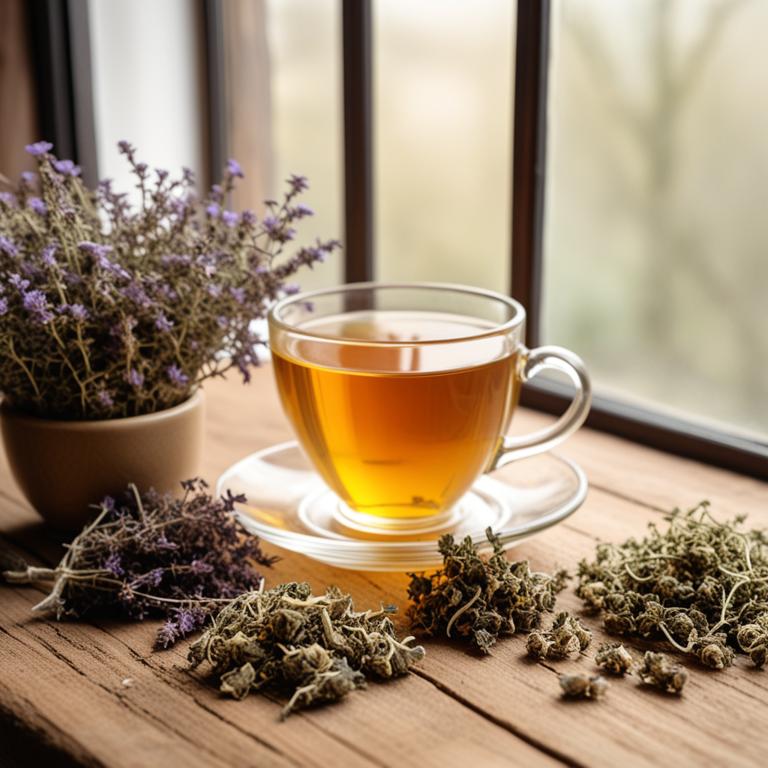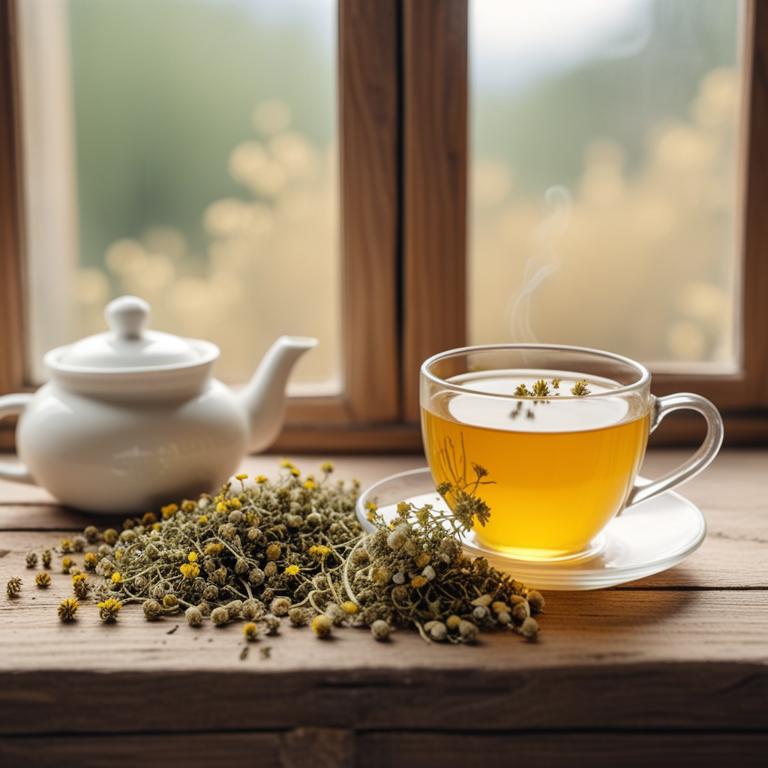10 Herbal Teas For Hay Fever

If you're one of the millions of people who suffer from hay fever, you know how miserable the symptoms can be.
Runny nose, itchy eyes, and constant sneezing can make everyday life a real challenge. But, did you know that herbal teas can be a great way to find some relief?. Herbs like Echinacea purpurea, Eucalyptus globulus, and Ginkgo biloba have anti-inflammatory properties that can help reduce swelling and ease congestion in the nasal passages.
Echinacea, for example, is known for its ability to boost the immune system, which can help your body fight off allergens. Eucalyptus, on the other hand, has a decongestant effect that can help clear out mucus and ease breathing. Ginkgo biloba is a natural antihistamine that can help reduce the release of histamine, the chemical that causes allergic reactions. Drinking herbal teas made from these herbs can help alleviate hay fever symptoms, allowing you to breathe easier and feel more comfortable.
By incorporating herbal teas into your daily routine, you can find some relief from the misery of hay fever and enjoy the simple things in life again.
- 1. Echinacea purpurea
- 2. Eucalyptus globulus
- 3. Ginkgo biloba
- 4. Sambucus nigra
- 5. Achillea millefolium
- 6. Lavandula angustifolia
- 7. Thymus serpyllum
- 8. Matricaria chamomilla
- 9. Melissa officinalis
- 10. Rosmarinus officinalis
1. Echinacea purpurea

Echinacea purpurea teas contains a mix of bioactive compounds like alkylamides, glycoproteins, and flavonoids.
These compounds have anti-inflammatory and immune-boosting properties that help the body fight off allergens and reduce symptoms of hay fever. The flavonoids in Echinacea purpurea, such as kaempferol and quercetin, have antioxidant properties that help to neutralize free radicals and reduce inflammation in the airways. The glycoproteins in Echinacea purpurea, particularly polysaccharides, stimulate the immune system to produce more cytokines, which help to fight off invading allergens.
By reducing inflammation and boosting the immune system, Echinacea purpurea teas can help alleviate symptoms of hay fever, such as congestion, sneezing, and itchy eyes.
- Gather 1 cup of fresh Echinacea purpurea flowers, 1 cup of boiling water, and a heat-resistant cup.
- Place the flowers in the heat-resistant cup and pour in the boiling water.
- Let the mixture steep for 5-7 minutes, then strain the liquid.
- Add honey or lemon to taste, if desired. Mix well.
- Drink the tea 2-3 times a day to help alleviate hay fever symptoms.
2. Eucalyptus globulus

Eucalyptus globulus teas contains bioactive compounds like eucalyptol and cineole, which have anti-inflammatory properties that help reduce swelling in the nasal passages.
These compounds also have natural antihistamine effects, which block the release of histamine, a chemical that triggers allergic reactions. The decongestant properties of eucalyptol help open up airways and relieve congestion, making it easier to breathe. The antiseptic properties of cineole also help fight off infections that can exacerbate hay fever symptoms.
By reducing inflammation and opening up airways, eucalyptus globulus teas can help alleviate symptoms of hay fever, such as congestion and runny nose.
- Gather 1 cup of fresh Eucalyptus globulus leaves or 1 teaspoon of dried leaves.
- Boil 1 cup of water in a pot.
- Add the Eucalyptus leaves to the boiling water and let it steep for 5-7 minutes.
- Strain the tea into a cup using a strainer or cheesecloth.
- Drink the tea hot or cold as needed to relieve hay fever symptoms.
3. Ginkgo biloba

Ginkgo biloba teas contains flavonoids and bilobalide, which are active constituents that help alleviate symptoms of hay fever.
Flavonoids have anti-inflammatory properties, reducing swelling and irritation in the nasal passages. Bilobalide, on the other hand, has antioxidant properties that help neutralize free radicals and reduce oxidative stress, which can exacerbate hay fever symptoms. The combination of flavonoids and bilobalide in Ginkgo biloba teas helps to relax blood vessels and improve blood flow, reducing congestion and sinus pressure.
By reducing inflammation, oxidative stress, and congestion, Ginkgo biloba teas can help provide relief from hay fever symptoms.
- Get 1 teaspoon of dried Ginkgo biloba leaves and 1 cup of boiling water.
- Steep the Ginkgo biloba leaves in the boiling water for 5-10 minutes.
- Strain the mixture into a cup using a tea strainer or cheesecloth.
- Add honey or lemon to taste, if desired.
- Drink the tea 2-3 times a day, 30 minutes before meals, to help with hay fever symptoms.
4. Sambucus nigra

Sambucus nigra teas contains flavonoids and phenolic acids, which have anti-inflammatory properties.
These compounds help reduce the production of histamine, a chemical released by the body during allergic reactions, such as those experienced with hay fever. Sambucus nigra teas also contain isorhapontigenin, which has been shown to inhibit the release of histamine from mast cells. The flavonoids in Sambucus nigra teas have antioxidant properties, which help protect the body from oxidative stress caused by allergies.
By reducing inflammation and inhibiting histamine release, Sambucus nigra teas may help alleviate symptoms of hay fever, such as congestion and runny nose.
- Gather 1 cup of dried Sambucus nigra flowers and 1 cup of boiling water.
- Add 2 tablespoons of dried Sambucus nigra flowers to a cup.
- Pour boiling water over the flowers and let it steep for 5-7 minutes.
- Strain the tea into another cup to remove the flowers. Discard the flowers.
- Drink the tea 2-3 times a day, or as needed, to help alleviate hay fever symptoms.
5. Achillea millefolium

Achillea millefolium teas contains bioactive constituents like apigenin, luteolin, and sesquiterpene lactones.
These compounds have anti-inflammatory and antihistamine properties that can help alleviate hay fever symptoms. The flavonoids in Achillea millefolium tea, such as apigenin and luteolin, have been shown to inhibit the release of histamine, a key player in allergic reactions. The sesquiterpene lactones in the tea have anti-inflammatory properties that can help reduce swelling and itching in the nasal passages.
By consuming Achillea millefolium tea, people with hay fever may experience relief from symptoms like congestion, sneezing, and itchy eyes.
- Gather 1 tablespoon of dried Achillea millefolium flowers.
- Pour 1 cup of boiling water over the flowers in a cup.
- Steep for 5-7 minutes, then strain the liquid.
- Add honey to taste, if desired, and mix well.
- Drink the tea 2-3 times a day to help alleviate hay fever symptoms.
6. Lavandula angustifolia

Lavandula angustifolia teas contains a significant amount of linalool and linalyl acetate, two active constituents known for their anti-inflammatory and antihistamine properties.
These properties make Lavandula angustifolia teas a potential remedy for hay fever, a condition characterized by an overactive immune response to harmless particles in the air. The antihistamine properties of linalool and linalyl acetate can help reduce the body's allergic reaction to pollen and other allergens, providing relief from symptoms like congestion and itchy eyes. Additionally, the anti-inflammatory properties of these compounds can help reduce swelling and itching associated with hay fever.
By consuming Lavandula angustifolia teas, individuals may be able to alleviate some of the discomforts associated with hay fever.
- Get 1 cup of boiling water and 1 tablespoon of dried Lavandula angustifolia flowers.
- Add the flowers to the boiling water and let it steep for 5-7 minutes.
- Strain the mixture using a tea strainer or cheesecloth into a cup.
- Add honey or lemon to taste, if needed.
- Drink the tea 2-3 times a day to help relieve hay fever symptoms.
7. Thymus serpyllum

Thymus serpyllum teas contains thymol, a key bioactive constituent that has natural anti-inflammatory properties.
These properties help reduce swelling and ease congestion in the nasal passages, a common symptom of hay fever. Thymol also has antimicrobial properties, which can help combat infections in the sinuses and upper respiratory tract. Thymus serpyllum teas also contains carvacrol, another bioactive compound that has antioxidant and anti-inflammatory effects, which can help alleviate hay fever symptoms.
By consuming Thymus serpyllum teas, individuals may experience relief from hay fever symptoms, including reduced itching and congestion.
- Gather 1 cup of fresh Thymus serpyllum leaves or 2 teaspoons of dried leaves.
- Measure 1 cup of boiling water.
- Add the Thymus serpyllum leaves to the boiling water.
- Let it steep for 5-7 minutes, then strain the liquid.
- Drink the tea 2-3 times a day to help with hay fever symptoms.
8. Matricaria chamomilla

Matricaria chamomilla teas contains apigenin and luteolin, two bioactive constituents with anti-inflammatory and antihistamine properties.
These compounds help to reduce the production of histamine, a chemical that causes the symptoms of hay fever, such as congestion and itching. The flavonoids and phenolic acids in chamomilla tea also have antioxidant properties, which can help to neutralize free radicals and reduce inflammation in the nasal passages and sinuses. Additionally, the tea's anti-inflammatory properties can help to reduce swelling and congestion, making it easier to breathe.
By consuming Matricaria chamomilla tea, individuals with hay fever may experience relief from their symptoms and enjoy a clearer and more comfortable breathing experience.
- Gather 1 cup of dried Matricaria chamomilla flowers.
- Measure 1 tablespoon of the dried flowers and place them in a tea infuser or a small muslin bag.
- Heat 1 cup of water in a saucepan and bring it to a boil.
- Remove the saucepan from the heat and add the tea infuser or muslin bag with the dried flowers.
- Steep for 5-7 minutes, then strain the tea and drink it warm or at room temperature.
9. Melissa officinalis

Melissa officinalis teas contains rosmarinic acid, apigenin, and linalool as its active constituents.
These compounds have anti-inflammatory and antioxidant properties, which help to reduce inflammation and oxidative stress in the body. The rosmarinic acid in Melissa officinalis teas has a natural decongestant effect, making it easier to breathe for people suffering from hay fever. The apigenin and linalool also have a relaxing effect on the body, which can help to reduce stress and anxiety related to allergies.
By reducing inflammation and promoting relaxation, Melissa officinalis teas can help alleviate symptoms of hay fever, making it a popular natural remedy for this condition.
- Gather 1 cup of fresh Melissa officinalis leaves and flowers, or 1 tablespoon of dried Melissa officinalis.
- Combine the Melissa officinalis with 1 cup of boiling water in a heat-resistant cup or teapot.
- Let the mixture steep for 5-7 minutes, then strain it into another cup using a tea strainer.
- Add honey to taste, if desired, and stir well to combine.
- Drink the tea 2-3 times a day, or as needed, to help relieve hay fever symptoms.
10. Rosmarinus officinalis

Rosmarinus officinalis teas contains carnosic acid, rosmarinic acid, and camphor as its active constituents.
These compounds have anti-inflammatory and antioxidant properties, which help to reduce swelling and fight free radicals in the body. Rosmarinic acid in particular has been shown to inhibit the release of histamine, a chemical that triggers allergic reactions, including those associated with hay fever. By reducing histamine release, Rosmarinus officinalis teas may help alleviate symptoms of hay fever such as runny nose, sneezing, and itchy eyes.
Regular consumption of this tea may also help to soothe and calm the respiratory system, reducing inflammation and promoting healing.
- Gather 1 cup of fresh Rosmarinus officinalis leaves or 2 teaspoons of dried leaves.
- Boil 1 cup of water in a pot.
- Add the Rosmarinus officinalis leaves to the boiling water.
- Reduce heat and let it steep for 5-7 minutes.
- Strain and drink the tea as needed for hay fever relief.